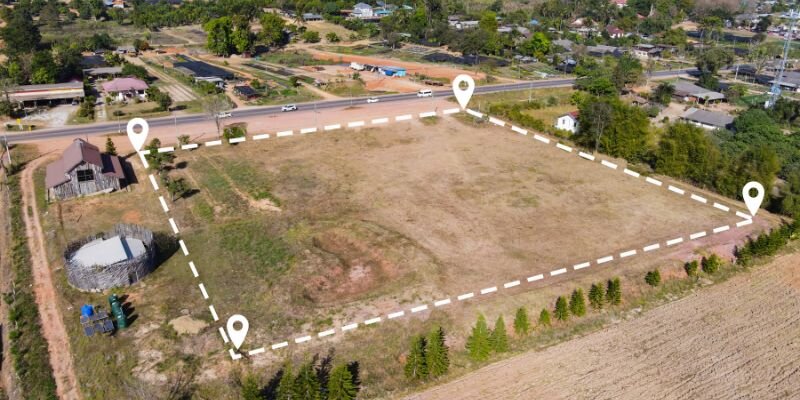
Understanding Mineral Rights: A Comprehensive Overview
When selling land in Texas, it’s important to know about mineral rights because they can greatly affect the land’s value. Mineral rights are the rights to own and use subsurface resources like oil, natural gas, coal, and other valuable minerals.
In Texas, a state rich in these resources, mineral rights are often severed from surface rights, meaning that different parties can own the surface land and the minerals beneath it. This separation can create complex legal and financial implications for property owners looking to sell their land.
Sellers need to know whether they own the mineral rights outright or if previous transactions have reserved those rights for another party. Potential buyers often seek properties with intact mineral rights due to the lucrative opportunities to extract and profit from these underground assets.
If you want to know how to maximize your real estate worth in Texas, you must understand how mineral leases work. These leases include things like royalty agreements and exploration permits. Suppose energy corporations are interested in exploring or drilling on your property. In that case, you must be well-versed in the local rules and regulations regulating mineral extraction to negotiate with them.
Properly evaluating and presenting these aspects can attract more interest from buyers who recognize the added value of owning surface land and its associated mineral rights.
Understanding Surface vs Subsurface Rights in Property Transactions
Knowing the difference between surface rights and subsurface rights is important to getting the most money out of real estate, especially when selling land in Texas. A person’s right to own and use the land’s surface, including any buildings or plants, is known as their surface right.
In contrast, subsurface rights, often called mineral rights, involve ownership and extraction rights for resources found beneath the land’s surface, such as oil, gas, coal, or other minerals. In Texas, a state rich in natural resources, these subsurface rights can significantly enhance property value.
Sellers must know that surface and subsurface rights can be severed or sold independently. While an individual may own the surface of a piece of land, they may not automatically possess the mineral rights unless explicitly stated in the deed.
Understanding this separation is essential for negotiating property transactions and ensuring sellers capitalize on surface and mineral values when selling their real estate assets. Ensuring clear delineation between these rights in legal documentation is critical to avoid disputes and optimize sale outcomes.
Insights Into the Texas Real Estate Market for Mineral-rich Lands
Selling mineral-rich acreage in Texas presents distinct opportunities and challenges for real estate agents. Due to the state’s abundance of natural resources, land in Texas with rich mineral rights, such as oil, natural gas, or other underground assets, is in high demand among investors.
It’s important for buyers who want to get the most out of their land to understand how this market works. Mineral rights can make a property much more valuable and appealing, but moving these rights can be tricky and needs to be done carefully.
The present demand patterns, driven by energy firms and developers seeking to utilize these resources, require sellers to know local rules. The selling procedure can be greatly facilitated with the help of experienced real estate agents focusing on mineral rights transactions.
An informed approach ensures that sellers attract serious buyers and secure optimal returns on their investment in Texas’s dynamic real estate landscape.
Evaluating the Value of Your Mineral Rights Before Sale

Thoroughly evaluating the value of mineral rights when selling land in Texas is crucial to maximizing your real estate investment. Mineral rights can significantly enhance a property’s overall worth, particularly in regions rich in oil, natural gas, and other valuable minerals.
To accurately assess their value, consider factors such as current market demand for specific minerals, existing leases or production agreements, and the geological potential of your land. Consulting with a professional appraiser specializing in mineral rights is advisable, as they can reveal recent trends and comparable sales data in the Texas area.
Additionally, understanding any legal restrictions or environmental regulations that may impact mining activities on your property is essential. By conducting comprehensive research and obtaining expert advice, you can effectively negotiate the sale price to reflect the actual value of your mineral rights while attracting interested buyers who recognize their potential profitability. If you’re located in North Texas, find out how to sell your Dallas house faster by working with local experts who understand the mineral market.
Key Steps to Selling Land with Mineral Rights in Texas
To get the most money for your property, you must know the most critical procedures in selling land with mineral rights in Texas. First, it’s essential to thoroughly examine the property’s mineral rights, including oil, gas, or other valuable resources.
This kind of evaluation usually needs to be done by a professional scientist or appraiser who knows how much these minerals are worth. Once you know their worth, keep all the formal papers that deal with ownership and transferability very well organized and up to date.
Engaging an experienced real estate attorney familiar with Texas laws regarding mineral rights can help navigate complex regulations and avoid potential pitfalls. Additionally, marketing the property effectively by highlighting its lucrative mineral assets can attract more interested buyers willing to pay a premium.
Using internet platforms and networks that focus on properties with mineral rights might help targeted investors see your property even more. Sellers can get the most money for their property by selecting a competitive price based on market trends and expert opinions, as long as they follow Texas rules for these kinds of sales. To better understand how our process works when selling land with mineral rights, working with an experienced team like Atlas Land Buyers is key.
Importance of Due Diligence When Selling Property with Minerals
Conducting thorough due diligence is crucial to maximizing real estate value when selling property in Texas with mineral rights. Understanding the details of the mineral rights associated with your land can significantly impact the sale price and attract potential buyers interested in oil, gas, or other minerals.
Make sure you control these rights because earlier deals may have split them from surface rights. It’s also important to look into any existing leases or agreements regarding the minerals under your land, as these can affect negotiations and buyer interest.
Consulting with legal experts specializing in Texas mineral law can help ensure that all documentation is accurate and up-to-date, minimizing risks and enhancing transparency during the sales process. Additionally, assessing the current market demand for specific minerals in your area offers helpful tips for setting a competitive price for your land.
By conducting due research first, sellers can better handle the complicated parts of real estate deals involving mineral rights and make their property more appealing to buyers.
Tax Implications of Selling Land with Mineral Rights in Texas
Understanding the tax implications when selling land with mineral rights in Texas is crucial for maximizing real estate value. Capital gains tax may apply to the proceeds from the sale of such property, resulting in significant tax consequences.
To correctly figure out any taxed gain, you need to know how much your land and mineral rights cost you in the first place. Furthermore, if you got royalties from mineral extraction before the sale, these are usually considered taxable income and must be reported accordingly.
There is no state income tax in Texas. But you still have to pay federal taxes, so it’s important to talk to a tax expert who knows about real estate and mineral rights deals. You might be eligible to deduct some costs associated with the sale, like legal fees or repairs undertaken to make the property worth more. This could lower your taxable income.
By being aware of these factors and planning strategically, sellers can effectively manage their tax liabilities while maximizing the financial return from their real estate investment in Texas’s lucrative market for land with mineral rights.
How to Market Land for Sale with Mineral Rights Effectively
When marketing land for sale with mineral rights in Texas, it’s crucial to highlight the unique value these rights add to the property. Begin by emphasizing the potential for lucrative returns from oil, gas, and other minerals beneath the surface.
Use top-notch images and comprehensive maps to highlight the area’s topography and resource-rich soil. Contact a real estate agent who specializes in mineral rights; they know who to approach to attract purchasers like energy firms and investors looking to cash in on Texas’s burgeoning resource industries.
Professional appraisals can support your asking price, and using online platforms dedicated to energy and real estate investments can increase your reach. The key to gaining the buyer’s trust is transparency about the ownership of mineral rights and any current leases or agreements.
You can attract genuine inquiries from motivated buyers who want to make the most of their investment by telling an engaging story about the property’s potential and being open and honest in all conversations.
Strategies for Enhancing the Appeal of Your Land Listing in Texas
When aiming to enhance the appeal of your land listing in Texas, particularly when selling property with mineral rights, it’s crucial to highlight unique attributes that set your land apart. Start by showcasing the potential for mineral extraction, which can significantly increase perceived value.
Provide detailed geological surveys and reports demonstrating valuable minerals such as oil, gas, or other resources. Highlighting legal assurances and clear titles regarding ownership of mineral rights can also attract serious buyers.
In addition to focusing on mineral rights, emphasize the land’s natural beauty and strategic location. High-quality photographs capturing scenic views and proximity to major roads or urban centers can substantially attract potential investors.
Furthermore, consider collaborating with local real estate agents specializing in properties with mineral rights; they possess invaluable insights into market trends in Texas and have access to networks extending beyond typical property listings. By leveraging these strategies, your land listing will stand out and draw interest from buyers eager to capitalize on Texas’s rich natural resources.
Exploring Buyer Interest: Who Buys Land with Mineral Rights?
To get the most money for your Texas land with mining rights, you must know who might buy it. People with different interests often look for properties with mineral rights. This includes individual investors who want to diversify their holdings and take advantage of these rights’ lucrative opportunities.
Energy companies are particularly keen on pursuing land rich in oil, gas, or other valuable minerals to enhance their extraction operations. Speculators also play a significant role in purchasing land with mineral rights in anticipation of future appreciation in value due to market demand or technological advancements in resource extraction.
Developers and property brokers might also buy these kinds of properties to combine them into bigger projects or to provide appealing packages for buyers. For landowners in Tarrant County, cash home buyers in Fort Worth are actively seeking properties with mineral rights and can offer competitive prices. Sellers can use this information to determine what buyers want and need to create marketing campaigns focusing on the benefits of owning land with mineral rights in Texas.
The Role of Real Estate Agents in Selling Land with Mineral Rights

Real estate professionals are very important for getting the most money for land with mineral rights in Texas. They give you experienced advice and help you plan your sale from start to finish. The Atlas Land Buyers team understands the Texas market and offers insights tailored to mineral-rich properties. They give you experienced advice and help you plan your sale from start to finish. These experts know a lot about the state market, especially the details unique to properties with mineral rights.
Their experience allows them to effectively assess the land’s potential and value by considering location, mineral demand, and current market trends. Real estate agents are adept at marketing these unique properties to attract suitable buyers who appreciate surface and subsurface assets.
They also navigate complex legal considerations, ensuring all transactions adhere to state mineral rights transfer regulations. Through their extensive networks and negotiation skills, real estate agents facilitate transparent communication between sellers and prospective buyers, aiming to secure competitive offers that reflect the actual value of the land and its mineral resources.
Utilizing Appraisals and Surveys in the Sale of Mineral-rich Properties
When selling land in Texas with mineral rights, appraisals and surveys are very important for getting the best price. When dealing with mineral-rich properties, appraisals are very important since they give a complete picture of the property’s value, including both surface and subsurface assets.
A professional appraisal will assess the potential income from minerals such as oil, gas, or other valuable resources beneath the land. On the other hand, detailed surveys can identify precise boundaries, ensuring that all mineral deposits are accounted for and legally documented.
These surveys help avoid arguments by clearly marking property limits and places where minerals can be mined. Appraisals and surveys give sellers a full picture of a property’s value, which helps them set competitive pricing and bargain well with purchasers interested in Texas’s profitable mineral rights market.
By utilizing these tools, property owners can better highlight their land’s unique attributes while ensuring transparency in transactions—and implement effective strategies for selling land at auction in Texas involving these valuable underground resources.
How to Transfer Ownership and Title of Land with Mineral Rights
Transferring ownership and title of land with mineral rights in Texas involves a detailed process that requires careful attention to legal documentation and state regulations. First, a thorough title search is essential to ensure no existing liens or encumbrances on the property.
This is an essential first step in establishing the validity of any land-related surface or mineral rights. To avoid disagreements, it’s vital to spell exactly which surface and mineral rights are being transferred in a deed that the parties concerned create after the title is established.
In Texas, sellers often distinguish between mineral and surface rights, underscoring the importance of clarity in this deed. Working with a real estate attorney specializing in Texas property law can help navigate these complexities.
After preparing the deed, all parties involved in the transaction must sign it, have it notarized, and then file it with the county clerk’s office where the property is located to legally record the change in ownership. Understanding how these steps interact with Texas’s unique oil and gas laws will ensure a smooth transition of land and mineral interests from seller to buyer.
Navigating Environmental Regulations When Transferring Land Ownership
Navigating environmental regulations is critical to maximizing real estate value when selling land with mineral rights in Texas. The state has specific environmental laws that landowners must adhere to when transferring ownership, mainly if the property includes valuable mineral resources like oil or natural gas.
Understanding the Texas Commission on Environmental Quality (TCEQ) guidelines is essential for ensuring compliance during the sale process. Sellers should conduct thorough due diligence to identify any existing environmental liabilities, such as contamination or endangered habitats, that could impact the value of their land.
One way to reduce the risk of legal trouble is to hire environmental consultants to help you evaluate your needs and obtain the appropriate permissions. To further protect oneself from unanticipated challenges, it is advisable to become acquainted with federal regulations enforced by organizations such as the Environmental Protection Agency (EPA).
Properly addressing these regulatory requirements protects the seller from litigation and enhances buyer confidence by demonstrating responsible management of environmental considerations associated with mineral-rich properties in Texas.
Top Mistakes to Avoid When Selling Property with Valuable Resources
When selling property with valuable mineral rights in Texas, it’s crucial to avoid several common pitfalls that can significantly impact your return on investment. One major mistake is failing to thoroughly evaluate the land’s mineral resources before listing.
Understanding the true worth of oil, natural gas, or other minerals beneath the surface is essential for negotiating a fair price. Another frequent error is neglecting to perform due diligence on potential buyers; verifying their financial stability and experience in resource extraction can prevent future complications.
Inadequate legal preparation is another trap; sellers should ensure all contracts are meticulously reviewed by lawyers familiar with Texas mineral rights laws to avoid disputes over ownership and royalties. Failure to adequately address environmental regulations could result in penalties or lost sales.
Additionally, rushing into agreements without comprehensive market research can undervalue the property, as fluctuating commodity prices directly influence demand for properties with resource potential. Finally, ineffective marketing strategies may fail to highlight the unique value proposition of land with mineral rights, missing opportunities to attract high-value offers from interested parties in this competitive real estate sector.
Can You Sell Your Mineral Rights in Texas?

You can sell your mineral rights in Texas, making your real estate deal worth a lot more. To get the most out of your real estate, you must know how owning land with mineral rights can help you make money and invest.
In Texas, a state renowned for its rich natural resources, mineral rights can be sold separately from surface rights, offering landowners a lucrative avenue to capitalize on their property assets. When selling land with mineral rights in Texas, conducting thorough due diligence and engaging experts who can explain the complicated mineral valuation and legal stipulations involved in such transactions is crucial.
Successfully marketing these precious assets, negotiating favorable conditions, and maintaining compliance with state requirements can maximize landowners’ returns. To make the most of your mineral rights in Texas’s competitive real estate market, it’s essential to stay updated about local market trends and legal requirements, whether you’re planning to sell or lease them.
How Much Do Mineral Rights Sell for in Texas?
When considering selling land with mineral rights in Texas, understanding the value maximizes your real estate investment. Mineral rights in Texas can vary significantly in price based on location, the type and amount of minerals present, and current market conditions.
In regions with high oil and gas activity, mineral rights can command a premium due to the demand from energy companies eager to access these valuable resources. On average, mineral rights in Texas might sell for anywhere between a few hundred and several thousand dollars per acre, depending on the richness of the resources beneath the surface.
Conducting a review with consulting specialists who specialize in actions is essential. You receive market value for our property’s ongoing royalties or lease agreements, which might influence its overall worth.
By strategically evaluating these elements, sellers can effectively maximize their real estate value when dealing with land that includes mineral rights in Texas.
What’s the Best Way to Sell Mineral Rights?
Maximizing real estate value when selling mineral rights in Texas requires a strategic approach. The best way to do this involves understanding the actual market value of your assets and leveraging expert advice.
First, conduct a comprehensive assessment of the property’s mineral potential by consulting a geologist or an appraiser specializing in mineral rights. Next, consider working with a reputable real estate agent or broker with experience in the Texas market and understanding the nuances of selling properties with mineral rights.
Putting your property on websites just for people who want to invest in minerals can also help it get more attention and fair offers. To be honest and earn the trust of buyers, you need all the paperwork you need, like current leases or production data.
Additionally, exploring auction options might yield higher bids due to competitive dynamics among potential buyers. By employing these strategies, sellers can effectively enhance their real estate value when selling land with mineral rights in Texas.
How Much Are Mineral Rights Worth Per Acre?
The complicated process of figuring out how much mineral rights are worth per acre in Texas is affected by many factors. The value of these rights can change greatly depending on where they are located, the minerals they contain, and the state of the market at the time.
Mineral rights can be exceedingly valuable in regions with oil or natural gas reserves. Factors such as proximity to existing drilling operations and the quality of accessible resources also play a critical role in assessing their potential worth.
Furthermore, mineral rights are susceptible to changes in value due to swings in commodity prices. If landowners want an accurate idea of their worth, they should talk to a real estate agent in their area who specializes in mineral rights or get an appraisal.
Understanding the value of mineral rights per acre can dramatically enhance your overall real estate strategy, ensuring you maximize your land’s potential when selling property in Texas.
Helpful Texas Blog Articles
- Expert Tips For Selling Hunting Land In Texas
- Discover Texas Land Zoning Details
- Closing Costs For Land Purchases In The Texas Real Estate Market
- Can You Sell Land Without a Title Company in Texas
- How to Determine the Value of Your Land in Texas
- Selling Inherited Land In Texas
- Selling Land With Mineral Rights In Texas
- Strategies For Selling Land At Auction In Texas
- Do I Need a Lawyer to Sell Land in Texas?
- Can I Sell Land to the City or County in Texas?
- How to Avoid Scams When Selling Land
- How to Market Land for Sale Online
- How to Sell Land to Out-of-State Buyers
- How to Avoid Capital Gains Tax When Selling Land
- How to Sell Commercial Land Near a Highway or Commercial Zone

| LESSEE | LESSOR | TAXED | MONEY | VENERGY | CONTRACTOR LAW |
| CASH | REPUTATION | PRICE OF OIL | CASH FLOW | BLOG | OIL & GAS |
| COMPANY | REVENUE | REASON | PIPELINES | PERCENTAGE | NOTHING |
| NEW MEXICO | MEXICO | LEGAL ADVICE | JURISDICTION | FORMULA | |
| COURTHOUSE | MINERAL RIGHTS YOU | MINERAL RIGHTS THE | OF SELLING MINERAL | FOR SELLING MINERAL | IN TEXAS CAN BE |
| RIGHTS IN TEXAS IS | OF SELLING MINERAL RIGHTS | FOR SELLING MINERAL RIGHTS | AN OIL AND GAS | THE OIL AND GAS |
